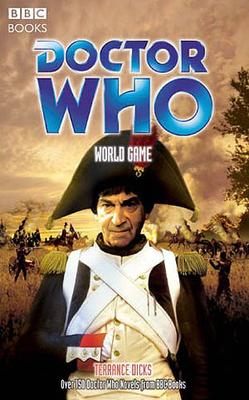 | |
| Author | Terrance Dicks |
|---|---|
| Series | Doctor Who book: Past Doctor Adventures |
Release number | 74 |
| Subject | Featuring: Second Doctor the Lady Serena |
| Set in | Period between The War Games and The Two Doctors (in the Second Doctor's timeline) [1] [2] |
| Publisher | BBC Books |
Publication date | 6 October 2005 |
| Pages | 285 |
| ISBN | 0-563-48636-8 |
| Preceded by | Fear Itself |
| Followed by | The Time Travellers |
World Game is a BBC Books original novel written by Terrance Dicks and based on the long-running British science fiction television series Doctor Who . It features the Second Doctor (Patrick Troughton) and the Lady Serena and is set during "Season 6B". It is also a partial sequel to another Dicks' Past Doctor Adventure, Players and documents the return of the Countess. The novel makes reference to the events of Sharpe's Triumph by Bernard Cornwell.